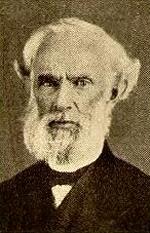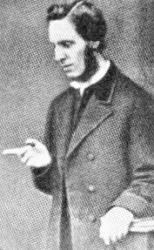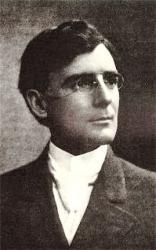
1811 - 1892 Person Name: L. H. Jameson Hymnal Number: 304 Author of "There Is A Habitation" in Greater Christian Hymns Born: April 17, 1811, Jefferson County, Indiana.
Died: April 12, 1892, Indianapolis, Indiana.
Buried: Crown Hill Cemetery, Indianapolis, Indiana.
Love Humphreys Jameson was born in Jefferson County in what was then the Territory of Indiana on May 17, 1811, the son of Thomas Jameson. Thomas had moved from Virginia to Kentucky around 1800 and later to the Indiana Territory in 1810 or early 1811. Thomas’s parents were members of the Calvinistic Kirk of Scotland and his wife’s parents held the views of the Church of England, but the family became Christians in 1816 with Love’s father and mother being baptized by John McClung, a young associate of Barton Warren Stone. Love, whose education was attended with all the difficulties associated with frontier life and was mostly under the tuition of his parents, was baptized in the fall of 1829 during a protracted meeting with Beverly Vawter and then preached his first sermon that same year on Dec. 25, following which he began preaching the gospel regularly.
From 1830 to 1834, Jameson taught school during the winters and made preaching trips in the summers. One of his mentors was Walter Scott, with whom he frequently travelled and worked. Moving to southern Ohio, in 1834, he, along with Scott, attended the famous debate of 1837 between Alexander Campbell and Bishop Purcell at Cincinnati, OH. In addition, he wrote frequently for Campbell’s paper, The Millennial Harbinger, in which Campbell spoke of him as the brother “whose praise is in all the churches in Indiana.” After preaching at various churches in Hamilton County, OH, Jameson worked with the church in Dayton from 1835 to 1837, when he married Elizabeth M. Clark. Also, in the closing years of B. W. Stone’s life, Jameson often accompanied the elderly preacher on his journeys. In 1840 he returned to Indiana and located at Madison, IN, the following year. His wife died of an apoplectic stroke suddenly soon afterwards, and he married Elizabeth R. Robinson in 1842, moving to Indianapolis, IN, which became his headquarters for the rest of his life.
In 1845, Jameson was asked, along with John O’Kane, to evangelize in the southwestern part of the state. Then after 1854, he made regular preaching trips into Ohio, Kentucky, Western Missouri, Illinois, New York, and even portions of New England. “There is a Habitation” was penned about 1860, with both words and original music by Jameson, but it never achieved any degree of popularity because of its slow, ponderous, torpid melody. The song as we know it was first published under the title, “O Sion, Sion,” in the New Christian Hymn and Tune Book, Part II, compiled at Cincinnati, OH, in 1882 by James Henry Fillmore. Jameson, who also provided the lyrics for “Night, With Ebon Pinion,” died ten years later, on May 1, 1892, in Indianapolis.
--hymnstudiesblog.wordpress.com
Love H. Jameson


 My Starred Hymns
My Starred Hymns








